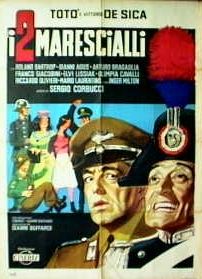| The Two Marshals | |
|---|---|
 | |
| Directed by | Sergio Corbucci |
| Written by | Totò Sergio Corbucci Marcello Fondato Sandro Continenza Bruno Corbucci Giovanni Grimaldi |
| Produced by | Gianni Buffardi |
| Starring | Totò Vittorio De Sica Gianni Agus Arturo Bragaglia |
| Cinematography | Enzo Barboni |
| Edited by | Roberto Cinquini |
| Music by | Piero Piccioni |
Release date |
|
Running time | 99 minutes |
| Country | Italy |
| Language | Italian |
The Two Marshals (Italian : I due marescialli) is a 1961 Italian comedy film written and directed by Sergio Corbucci. [1] [2] [3] The film was a hit at the Italian box office, with 2.765.531 spectators and a total gross of 536.513.000 lire. [4]
